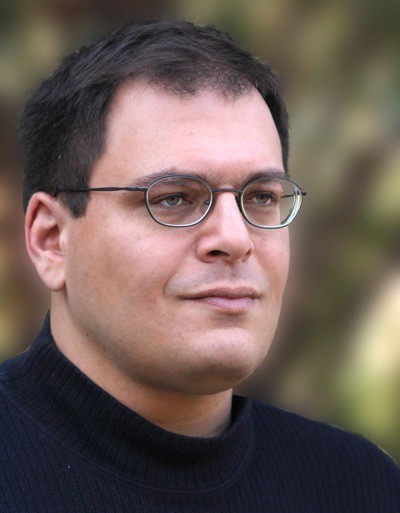
Jeffrey A. Hadler
Associate Professor of South and Southeast Asian Studies
Jeffrey Alan Hadler, Associate Professor and former Chair of the Department of South and Southeast Asian Studies and the Center of Southeast Asia Studies at the University of California, Berkeley (Cal), passed away on Wednesday, January 11, 2017, after a brief and intense battle with cancer. His passing deprived the campus of a prize-winning scholar of Southeast Asian studies, an exceptionally devoted undergraduate teacher and graduate supervisor, and a dear friend and mentor to many Cal faculty and staff.
Born in Boston on March 27, 1968, Jeff grew up in Chapel Hill, North Carolina. Following his graduation from Chapel Hill High School, he received his B.A. from Yale University (1990). There he worked with Professor James Scott and designed his own major, combining literary studies, anthropology, and political science. After Yale, Jeff completed his M.A. (1994) and Ph.D. (2000) at Cornell University. Professor Takashi Shiraishi and Professor Benedict Anderson supervised his dissertation, which focused on the Minangkabau community of West Sumatra. After graduating from Cornell, Jeff was a Fulbright Senior Scholar at the State Islamic University Syarif Hidayatullah in Jakarta, Indonesia (2000-01). In 2001, he moved to Berkeley as a tenure-track assistant professor. He was promoted to associate professor with tenure in 2009.
Jeff rapidly made a name for himself in the field of Southeast Asian Studies. Between 1998 and 2014, he published on a wide variety of subjects, including Indonesia during the Soeharto years, the place of the Nineteenth Century religious cleric Tuanku Imam Bondjol in contemporary Indonesia, and overlaps between anti-Semitism and anti- Chinese sentiments in colonial and post-colonial Indonesia. In 2008, he published a much admired book, Muslims and Matriarchs: Cultural Resilience in Indonesia through Jihad and Colonialism (Cornell University Press). In 2010, an Indonesian translation came out, and in 2011 the Association of Asian Studies awarded the book the Harry Benda Prize in Southeast Asian studies. At the time of his death Jeff was working on a potentially groundbreaking study, located at the interstices of history, art history, and literary studies, on the famous Indonesian philosopher and painter Nashar.
Jeff’s intellectual commitment to Southeast Asia was deep and capacious. Nowhere was this more apparent than in his service to the field. In addition to serving as a founding board member of the American Institute for Indonesian Studies (from 2011 until his death), he served as a member of the Southeast Asia Council of the Association of Asian Studies (2009-2012), the Executive Committee of the Southeast Asia Microform Project (2011-2014), and the Fellowship Selection Committee of the Charlotte W. Newcombe Doctoral Dissertation Fellowship (from 2009 until his death). At Berkeley, Jeff was a committed institution builder. As well as having given extraordinary service to the Department of South and Southeast Asian Studies and the Center for Southeast Asian Studies, he served on the Graduate Council’s Fellowships and Graduate Scholarships Committee (from 2012 until his death) and the Academic Senate’s Committee on Research (2010-2012).
In a department with a record of teaching excellence, Jeff was one of the most effective and most popular teachers. He taught courses on insular Southeast Asia, Islam in Southeast Asia, culture and art in Indonesia, and Indonesian history. As an undergraduate teacher, Jeff was known for great storytelling skills and devotion to his students. For graduate students, he was a particularly perceptive and steadfast advisor who never refused reading and commenting on multiple drafts of research papers, dissertation chapters, postdoctoral applications, job letters, and job talks.
Along with Jeff’s generosity of spirit, he could be counted on for a consistent stream of self-deprecating wit.
Walking in the corridors of Dwinelle and across campus, he was a memorable sight in his colorful shirts (mostly all made from the traditional Javanese fabric known as lurik, usually worn by laborers and villagers) and toe-less sandals, with that distinct ambling gait.
In administrative affairs, Jeff had an unmatched moral compass. He devoted many hours in the last years of his life to combatting sexual harassment at UC Berkeley. He was also a talented wordsmith, with a gift for both the spoken and written word, as readers of the deeply moving blog he wrote in his final weeks will attest. Jeff’s writing conveyed his indomitable sense of humor and zest for living. Of the slow response to sexual harassment at Cal, he said: “I’m tired of being told to keep my mouth shut and let the wheels of justice turn, because they’re turning pretty slowly.” And then of his own impending death he wrote: “Whistling past the grave’s the only way to go.”
Jeff is survived by his wife Kumi and their daughters, Maia and Noe. He also leaves behind his parents, Nortin and Carol Hadler of Chapel Hill, North Carolina, and his sister Elana Perl and her family of Washington, D.C.
Jake Dalton
Munis D. Faruqui
2017
